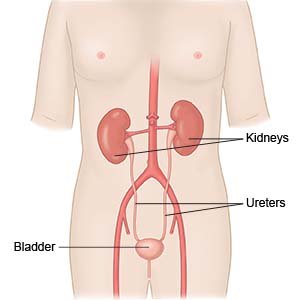Open Nephrolithotomy
Medically reviewed by Drugs.com. Last updated on Aug 4, 2025.
Open nephrolithotomy is surgery to remove kidney stones.
 |
WHILE YOU ARE HERE:
Before your surgery:
- Informed consent is a legal document that explains the tests, treatments, or procedures that you may need. Informed consent means you understand what will be done and can make decisions about what you want. You give your permission when you sign the consent form. You can have someone sign this form for you if you are not able to sign it. You have the right to understand your medical care in words you know. Before you sign the consent form, understand the risks and benefits of what will be done. Make sure all your questions are answered.
- An IV will be placed into a vein. You may be given liquids or medicine through the IV.
- Antibiotics may be given to help prevent an infection caused by bacteria. Tell your surgeon if you had an allergic reaction to antibiotics.
- An enema may be needed before your surgery. This is liquid put into your rectum to help empty your bowel.
- General anesthesia will keep you asleep and free from pain during surgery. You may get anesthesia through your IV. You may breathe it in through a mask or a tube placed down your throat. The tube may cause you to have a sore throat when you wake up.
- A Foley catheter is a tube put into your bladder to drain urine into a bag. Healthcare providers will remove the catheter as soon as possible to help prevent infection.
During your surgery:
- Your surgeon may inject contrast liquid and use an ultrasound to see parts of the kidney. He or she will make an incision in your side.
- Your surgeon will make an incision in your kidney and remove the stones. He or she may also remove a small part of the kidney to help the urine drain better. He or she may remove the whole kidney if it is badly damaged by the stones. X-rays of the kidney will be taken to check if all stones have been removed.
- Drains will be put near the kidney to remove fluid from your incisions. The incisions will be closed with stitches or surgical tape and covered with bandages.
Related medications
After your surgery:
You will be taken to a room to rest until you are fully awake. Healthcare providers will monitor you closely for any problems. Do not get out of bed until your healthcare provider says it is okay. When your healthcare provider sees that you are okay, you will be taken to your hospital room. The bandages used to cover your stitches keep the area clean and dry to prevent infection. A healthcare provider may remove the bandages soon after your surgery to check the surgery area or drains.
- You will be helped to walk around after surgery. Movement will help prevent blood clots. You may also be given exercises to do in bed. Do not get out of bed on your own until your healthcare provider says you can. Talk to healthcare providers before you get up the first time. They may need to help you stand up safely. When you are able to get up on your own, sit or lie down right away if you feel weak or dizzy. Then press the call light button to let healthcare providers know you need help.
- Intake and output of liquids may need to be tracked. Your healthcare providers may need to track the amount of liquid you are getting. They may also need to know how much you are urinating. Healthcare providers may need to strain your urine to check for stones. Do not flush your urine down the toilet unless healthcare providers say it is okay.
- Medicines may be given to prevent or treat pain, nausea, or an infection caused by bacteria.
RISKS:
You may develop an infection or bleed more than expected. You may also feel pain and weakness in your abdominal muscles. Your stomach, intestines, blood vessels, or nerves may be injured during the surgery. You could have trouble breathing. Even after surgery, kidney stones may form again. You may get a life-threatening blood clot in your leg or arm.
CARE AGREEMENT:
You have the right to help plan your care. Learn about your health condition and how it may be treated. Discuss treatment options with your healthcare providers to decide what care you want to receive. You always have the right to refuse treatment.© Copyright Merative 2025 Information is for End User's use only and may not be sold, redistributed or otherwise used for commercial purposes.
The above information is an educational aid only. It is not intended as medical advice for individual conditions or treatments. Talk to your doctor, nurse or pharmacist before following any medical regimen to see if it is safe and effective for you.
Further information
Always consult your healthcare provider to ensure the information displayed on this page applies to your personal circumstances.
